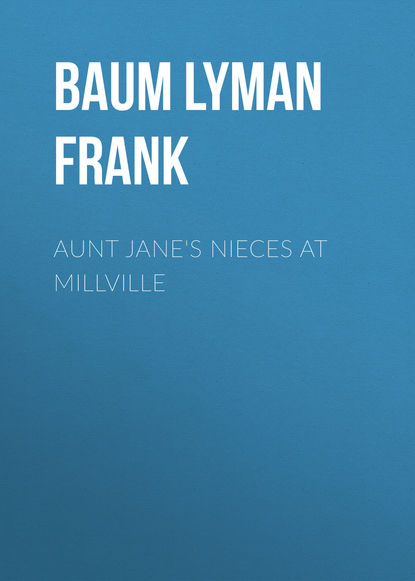По всем вопросам обращайтесь на: info@litportal.ru
(©) 2003-2025.
✖
Aunt Jane's Nieces at Millville
Настройки чтения
Размер шрифта
Высота строк
Поля
Mary came out. She had taken off her things and donned her white apron.
"The house is quite wonderful, Mr. Merrick," she said. "There is everything we can possibly need, and all as neat as wax."
The report stirred the girls to explore. They all trooped into the big living room and were at once captivated by its charm. Nora led them upstairs to their chambers, finding the way as unerringly as if she possessed perfect vision, and here a new chorus of delight was evoked.
"The blue room is mine!" cried Louise.
"Mine is the pink room," said Beth.
"And I choose the white room," declared Patsy. "The Major's is just next, and it will please him because it is all green and gold. But where will Uncle John room?"
"The master will use the right wing," said old Nora, who had listened with real pleasure to the exclamations of delight. "It were Cap'n Wegg's room, ye know, an' we've fitted it all new."
Indeed, Uncle John was at that moment inspecting his apartment, and he sighed contentedly as he congratulated himself upon his foresight in sending down the furnishings on the chance of their being needed. They had effected a complete transformation of the old house.
But who had arranged everything? Surely the perfect taste and dainty touch evidenced everywhere was not to be attributed to blind Nora. The little man was thoughtful as he turned to Old Hucks.
"Who did it, Thomas?" he asked.
"Miss Ethel, sir; the school-ma'am."
"Oh. A city girl?"
"No, sir. Crazy Will Thompson's granddaughter. She lives 'bout nine mile away."
"Is she here now?"
"Went home this mornin', sir. It were a great pleasure to her, she said, an' she hoped as how you'd like everything, an' be happy here."
Undo John nodded.
"We must call on that girl," he remarked. "We owe her a good deal, I imagine, and she's entitled to our grateful thanks."
CHAPTER VI.
PEGGY PRESENTS HIS BILL
Millville waited in agonized suspense for three days for tangible evidence that "the nabob was in their midst," as Nib Corkins poetically expressed it; but the city folks seemed glued to the farm and no one of them had yet appeared in the village. As a matter of fact, Patsy and Uncle John were enthusiastically fishing in the Little Bill, far up in the pine woods, and having "the time of their lives" in spite of their scant success in capturing trout. Old Hucks could go out before breakfast and bring in an ample supply of speckled beauties for Mary to fry; but Uncle John's splendid outfit seemed scorned by the finny folk, and after getting her dress torn in sundry places and a hook in the fleshy part of her arm Patsy learned to seek shelter behind a tree whenever her uncle cast his fly. But they reveled in the woods, and would lie on the bank for hours listening to the murmur of the brook and the songs of the birds.
The temper of the other two girls was different. Beth De Graf had brought along an archery outfit, and she set up her target on the ample green the day following her arrival. Here she practiced persistently, shooting at sixty yards with much skill. But occasionally, when Louise tired of her novel and her cushions in the hammock, the two girls would play tennis or croquet together – Beth invariably winning.
Such delightful laziness could brook no interference for the first days of their arrival, and it was not until Peggy McNutt ventured over on Monday morning for a settlement with Mr. Merrick that any from the little world around them dared intrude upon the dwellers at the Wegg farm.
Although the agent had been late in starting from Millville and Nick Thorne's sorrel mare had walked every step of the way, Peggy was obliged to wait in the yard a good half hour for the "nabob" to finish his breakfast. During that time he tried to decide which of the two statements of accounts that he had prepared he was most justified in presenting. He had learned from the liveryman at the Junction that Mr. Merrick had paid five dollars for a trip that was usually made for two, and also that the extravagant man had paid seventy-five cents more to Lucky Todd, the hotel keeper, than his bill came to. The knowledge of such reckless expenditures had fortified little McNutt in "marking up" the account of the money he had received, and instead of charging two dollars a day for his own services, as he had at first intended, he put them down at three dollars a day – and made the days stretch as much as possible. Also he charged a round commission on the wages of Lon Taft and Ned Long, and doubled the liveryman's bill for hauling the goods over from the Junction. Ethel Thompson had refused to accept any payment for what she had done, but Peggy bravely charged it up at good round figures. When the bill was made out and figured up it left him a magnificent surplus for his private account; but at the last his heart failed him, and he made out another bill more modest in its extortions. He had brought them both along, though, one in each pocket, vacillating between them as he thought first of the Merrick millions and then of the righteous anger he might incur. By the time Uncle John came out to him, smiling and cordial, he had not thoroughly made up his mind which account to present.

















